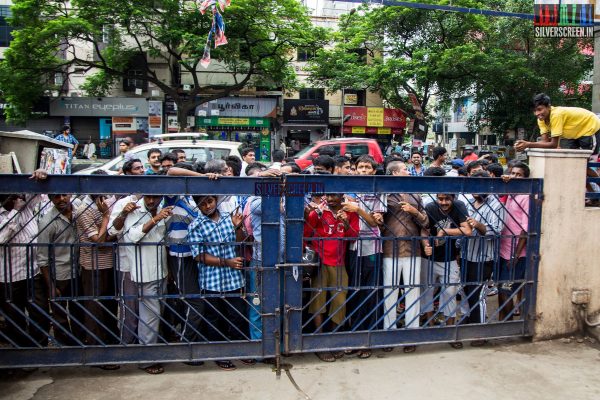Depending on the stand taken at a joint discussion among theatre owners in Tamil Nadu on Thursday, at least 60 per cent of the screens in the state are at risk of shutting down, says Tirupur Subramaniam, president, West Zone Theatre Owners’ Association.
“Already four theatres in Pollachi and three in Kangeyam of the 169 theatres in the west zone have closed,” says the veteran distributor. These screens will fall by the wayside for what looks like a battle of wits between the Digital Service Providers (DSPs) and producers.
Every time a tussle begins, the Tamil film audience is introduced to the moot point of discontent – the Virtual Print Fee (VPF). That is one term everyone is bandying about since March 1, following the stand-off between South Indian film producers and DSPs. Qube, the market leader among DSPs in the South with about 700 screens in Tamil Nadu and 2,000 in the region, and another DSP, UFO {the two entities are to shortly enter into a merger} have, in a meeting held in Hyderabad, worked out a deal with the Joint Action Committee of South Indian Film Chamber of Commerce, offering a 25-35 per cent reduction, but the Tamil Nadu faction has not agreed to the new, reduced rates. A source in the know of the ongoing negotiations says that it is asking for zero VPF, either immediately or in the short term. Theatres in Andhra Pradesh and Telangana will reopen from Friday. The Malayalam and Kannada industries went on a token day-long strike.
In a post on social media, which we had reported on, producer’s council member SR Prabhu laid threadbare the producers’ argument. Filmmaker Jayendra, co-founder Qube, had given a point-by-point rebuttal to the issues raised.
Senthil Kumar, co-founder Qube, says that the company is unable to understand the real intent behind the strike, because “the money we are speaking about is too little; there’s surely a bigger picture”. Rumours are rife that two other DSPs are wooing Tamil producers with better introductory rates. But, will the distributors oblige? Subramaniam says they are very happy with Qube, as theatre owners have been working for long with the company. “Digital projection improved clarity. Earlier, we faced scratches on film and similar issues.”
Senthil says what is upsetting is the lack of transparency. “They claim we said we will stop charging VPF in five years; it was never part of our business plan. We have been very polite every time this issue has been raised, and answered the queries raised. We have shown them the refund statements… Rationally, they do not have an argument.”
Part of the issue is that producers believe the DSPs are minting money through this arrangement. That is something Senthil stoutly refutes. “It costs very little to request the Registrar of Companies for our annual statement. We hardly make 3-6 per cent on the capital invested (Rs. 450 crore plus). It’s not even as remunerative as putting it in a fixed deposit. We survive because of ad revenue.”
Lucrative advertisement revenue is also a source of discontent; producers want a chunk of the ad revenue, but DSPs say the right of ownership legally rests with the theatre owner. In some cases, they directly deal with advertisers; in others, they have entered into agreements with DSPs for the same.
To the argument that the charges are high, Senthil says there are other aspects of the film business that are more expensive. “We are a great option for small-budget films. Do you know it costs Rs. 10,000 to just send publicity cards to theatres for display on notice boards?”
Senthil would like the producers to go back and see how much they have saved on print costs. “We reduced it by 1/4th, and now by 1/5th. We made it possible to increase the size of release.”
With this issue raising its head off and on, how difficult is it to keep the business afloat? The industry is a very complex space to operate out of, and given a choice, we would not have entered it today, says Senthil. “Luckily, we got in early, burnt our hands and learnt fast enough. Today, we have products in 50 countries, including 1,000s of screens in China.”
Recommended
In all this air of animosity, the distributors feel left out. Subramaniam says that the worst hit are theatre owners, who are forced to re-release old movies. “But, where are the footfalls?” he asks. Senthil says DSPs are an “easy target, caught between theatre owners with whom they have a long-standing relationship, and producers.”
So, is the charge for Tamil Nadu higher? Why have producers from the State held out despite others in the region accepting the renegotiated terms? “That is something that puzzles me too. In fact, our rates are lower than Mumbai. We charge producers for mastering there. Here, we offer free mastering, projection, drive duplication and delivery, key management and archival services. Abroad, we charge $850 for a flat run. Here, it used to be Rs. 27,500 and we have reduced it to Rs. 21,750.
If push comes to shove and the industry sticks to its demand of nil VPF, Senthil says the writing on the wall is clear: “We will have to declare bankruptcy if we don’t get an income from our investment. But, we will fight to the end.”



